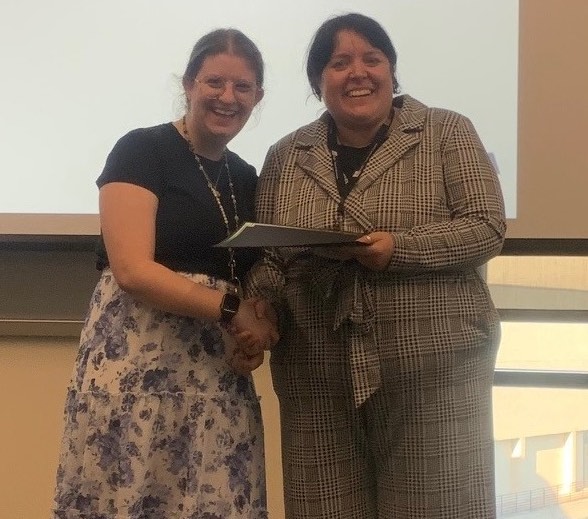Hannah Vedder, a neuroscience graduate student at the University of Texas Medical Branch at Galveston (UTMB), was awarded first place at the 2025 T1–T4 in 3 Minutes competition earlier this month.

In front of a live audience on the UTMB campus, Vedder had just three minutes to describe her research on an important feature of our nervous system. Vedder studies myelin–a fatty substance that coats the outside of nerve cells, akin to how crescent rolls wrap around a sausage in the snack called pigs in a blanket, she said. Myelin insulates the electrical impulses that travel through nerve cells, helping the signals move quickly and efficiently. If the coating is damaged, as happens in multiple sclerosis, the transmission of impulses is disrupted and affected individuals can have trouble walking, vision loss, and other symptoms. Vedder’s research explores how myelin is formed in healthy brains with the aim of one day developing new treatments that could replace the myelin destroyed by disease.
Vedder was one of 14 finalists in this year’s T1–T4 in 3 Minutes competition, which has been organized by UTMB’s Institute for Translational Science (ITS) since 2016. Each year, graduate students and other early career researchers submit lay friendly abstracts for consideration. Selected finalists then compete in front of an audience of peers and community members to see who can best describe their research in an easily digestible manner in three minutes or less.
The “T1–T4” in the event title refers to the different stages of translational research— a discipline focused on moving scientific discoveries from the notebooks of researchers into the hands of doctors and patients. Translational research covers a wide swath of studies ranging from early proof-of-concept studies (T1) to clinical trials (T2), studies in clinics and other real-world settings (T3), and studies at the population level (T4). The ITS’s T1–T4 competition aims to improve the science communication skills of researchers working at any of the four translational stages.
In her brief allotted time and with only a project image of pigs in a blanket to help her, Vedder received the highest scores of the night, putting her in first place, which came with a $750 cash prize.
For nearly 10 years, participation in the event has been limited to UTMB researchers. But this year, the competition included researchers from Houston Methodist and Texas Southern University. Both of these institutions are part of a growing alliance with UTMB and the University of Houston-Clear Lake that aims to unite complementary expertise and resources to advance translational science, community engagement, and workforce development in the Houston-Galveston region.
Opening up the competition to the other alliance partners brought keen competition. After Vedder, all remaining prizes went to Houston Methodist.
Second place, which included a $500 cash prize, was awarded to Houston Methodist nanomedicine graduate student Danilo Settis for his presentation “A story of transplanted cells and the Immune System PD, starring a nanotechnology-base sheriff to maintain the harmony.” Third place, which included a $250 cash prize, was awarded to Houston Methodist and University of Houston Biomedical Engineering graduate student Giulia Zaffaroni for her presentation, “Healing Diabetic Wounds-A Spoonful of Sugar for Recovery.”
The 2025 People’s Choice award winner was Applied Math to Biomedicine graduate student Elisa Serafini for her presentation “Virtual coronary arteries to save real hearts.”
Finally, Emily Huang, MD a urology resident at Houston Methodist, received the Early Career Investigator award for her presentation “Hematuria Tags: A Device to Standardize Communication for Post-Operative Hematuria.” This award included a $750 cash prize.